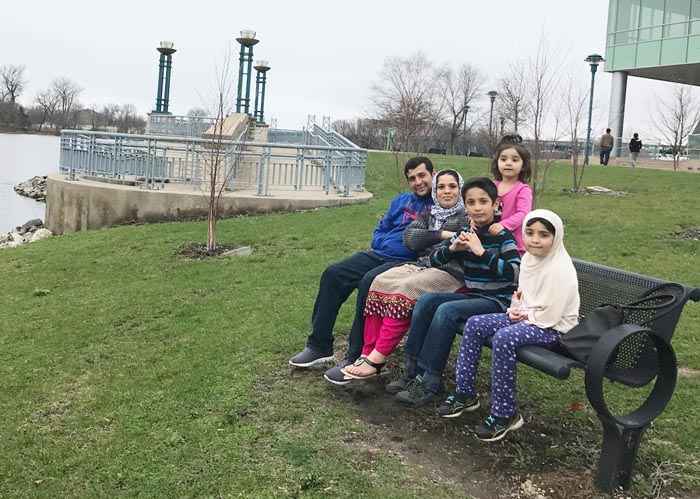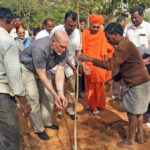
A refugee family from Afghanistan enjoys time together on the riverfront in the Quad-City area in this photo taken a few years ago. Pictured, from left, are Aziz Aziz and his wife, Nooria, and their three children.
By Barb Arland-Fye
The Catholic Messenger
In 2015, the Taliban blew up the main gate of the home of Aziz Aziz, an Afghan working for the U.S. Army Corp of Engineers in Kandahar in southern Afghanistan. Aziz was at work at the time and his two oldest children were at school. However, his wife Nooria and their baby daughter Marwa were in the house. The terrified mother grabbed her sleeping baby and headed to the bunker of their home’s lower level.
Mother and daughter remained safe in the bunker, but the traumatic experience accelerated the need for Aziz to obtain a Special Immigrant Visa (SIV). One night the following year, around 1 a.m., Aziz received a startling, life-changing phone call from a U.S. Army major. “Aziz, in 30 minutes we are arriving at your home and (you need to) get out.” Aziz needed a minute to process what he was hearing. “People are on the way (to) attack your house,” the Army major said. “Let’s go.”
Aziz, 35, shared the riveting story of his family’s escape and the aftermath with members of the Diocese of Davenport’s CRS (Catholic Relief Services) Chapter during their virtual gathering last month. “Our event was focused on migrants and refugees,” said Deacon Joe Welter, of the diocesan CRS chapter. “Aziz’s story seemed like a natural fit.”
Deacon Welter learned about Aziz through World Relief Quad Cities, which works through the U.S. State Department’s Bureau of Population, Refugees, and Migration (PRM) to assist refugees settling in the U.S. Now living and working in California, Aziz also provides interpreter/ translation services for World Relief Services Quad Cities.
“My hope is that people hear about a family that has experienced a traumatic event — being forced from their home, family and friends. This is happening all over the world,” Deacon Welter said. “I also hope people experience a family that persevered and has a tremendous amount of gratitude for those that helped them. Aziz has a great story to share that puts a real face on the topic of refugees and migrants.”
The storming of his house by the Taliban was not the first time the fundamentalist Islamic militia had threatened Aziz and his family. In 2011, his son, Farid Ahmad, who was 5 years old then, answered the door to accept what Aziz described as a “trick invitation.” The boy and his mother were unable to read the text and waited for Aziz to get home to read it. “A threat was written on the letter that stated that I had to quit my job with the U.S. Army as soon as possible. If not, they would kill me and my wife and (other) family members.”
The jarring phone call in the middle of the night Nov. 16, 2016, convinced Aziz that he and his immediate family must flee — leaving behind their homeland, relatives, friends, and his good-paying job. Aziz worked 12 years for the U.S. government. His father, who also worked with the U.S. military, encouraged then-19-year-old Aziz to demonstrate his translation skills for military officials. Aziz eventually served as operation and maintenance south regional manager with the U.S. Army Corps of Engineers. The facilities served the Afghan Army and police.
Aziz, his wife and children flew out of Afghanistan with a stopover in Dubai, a city in the United Arab Emirates, before arriving at Chicago’s O’Hare Airport. Greeting them were David Greenleaf, Aziz’s direct supervisor in Afghanistan, and Greenleaf’s son. “They brought us to their home and we lived in the family home for about two weeks,” Aziz said. Through the U.S. State Department, World Relief Quad Cities provided assistance for rent and other needs for the family’s first three months in the U.S., said Laura Fontaine, the agency’s director.
Just before Christmas, two pickup trucks loaded with gifts arrived at Aziz’s home in Monmouth, Illinois. “The whole community decided in Christmas 2016 that all the gifts had to go to the Aziz family,” he told the CRS Chapter members. His gratitude is immeasurable. He shows his family the photograph he took that day as a reminder of the generosity of Americans and the blessing of living in the United States.
“The people of the United States are the greatest people. I received so much from them,” said Aziz. Eager to support his family, he started work as a school custodian a few months later. Then he worked in quality assurance for a meatpacking plant. Culture shock was a challenge to overcome. “In the beginning, it was very hard, especially hard for my wife,” Aziz said. One month after their arrival, she spent a week in the hospital. “It was too big of a change for her to come from one part of the world to another.”
With support and encouragement from her husband and others, she enrolled in classes to learn to read and speak in English. “America is the land of opportunity. Yes, it is, but it depends on the person,” he said, speaking proudly on behalf of his family. “My wife, when she came to the United States, she didn’t even know in her own language how to write and read… My wife is now writing in English and reading in English and looking for a job,” he said. She is also the first woman in their extended family to learn to drive.
Whenever Nooria remembers that traumatic day in 2015 when the Taliban broke into her home, “My love becomes stronger for this country,” Aziz said she told him. “If I had not made it to the bunker with my daughter, I wouldn’t be here.”
The family moved to the Los Angeles area a few years ago to be closer to other Afghan families. Aziz worked as an Uber driver, a security guard and now has a small trucking business. The couple’s children — Farid Ahmad, 15, Shafiqa, 12, and Marwa, 7 — are in school and thriving, speaking English as if it were their native language, Aziz said. Farid Ahmad, now in 10th grade, wrote an award-winning essay in eighth grade about his family’s experience and how the Americans helped them.
Farid Ahmad “remembers the day he received the information that his mom and little sister were under attack. The Taliban was inside the house. They were looking to kill his sister, his mom, his father, the whole family.” The son tells his father, “I want to be a good person to protect this country, to protect the people of America.” Aziz said he told his son, “Just be a good person and help your neighbors. Remember where you came from and what you have that you got with help in America.”
Aziz demonstrates his appreciation for America in another way, assisting World Relief Quad Cities with interpreter and translation services for new Afghan families arriving in the Quad Cities. “We would love to have Aziz move back. He’s waiting on his citizenship documents before moving,” Fontaine said. “His interpretation skills are amazing and he knows the culture, therefore he’s been such an asset teaching us along the way. He’s helping with cultural orientation for our families, which is a blessing.”
Applying for visas
The Special Immigrant Visa program is available to persons who worked with the U.S. Armed Forces or under Chief of Mission authority as a translator or interpreter in Iraq or Afghanistan. This program offers visas to up to 50 persons per year, according to the U.S. Department of State. More information is available (https://tinyurl.com/4j8wbkf3).
CRS reaches out
Catholic Relief Services (CRS) “supports refugees and others who have been displaced around the world with basic necessities like food, clean water, medical assistance, shelter and sanitation infrastructure,” according to its website. For more information, visit (https://tinyurl.com/mufm56ts).
Sean L. Callahan, president and CEO of CRS, is urging immediate international response to the suffering of the people of Afghanistan, which has grown more acute after the U.S. pullout in August, the Taliban’s takeover, the freezing of assets and aid, and extreme drought. Read his report (https://tinyurl.com/24w7456u).
CRS offers an opportunity to mobilize Catholics and others of goodwill to end global poverty through participation in CRS chapters. Three CRS chapters have formed in Iowa: the Diocese of Davenport Chapter, the University of Iowa Chapter, and the Diocese of Des Moines Chapter. “The three chapters will be collaborating when possible,” said Deacon Joe Welter of the diocesan chapter. For more information, contact Deacon Welter at welterj@diodav.org.
World Relief Quad Cities
World Relief Quad Cities, a not-for-profit agency, provides services to refugees and immigrants in Western Illinois and Eastern Iowa. The agency seeks to provide “financial, emotional, cultural, and spiritual support to refugees — victims of war and persecution around the world — who are being placed in the Quad Cities.” For more information, visit (worldrelief.org).











